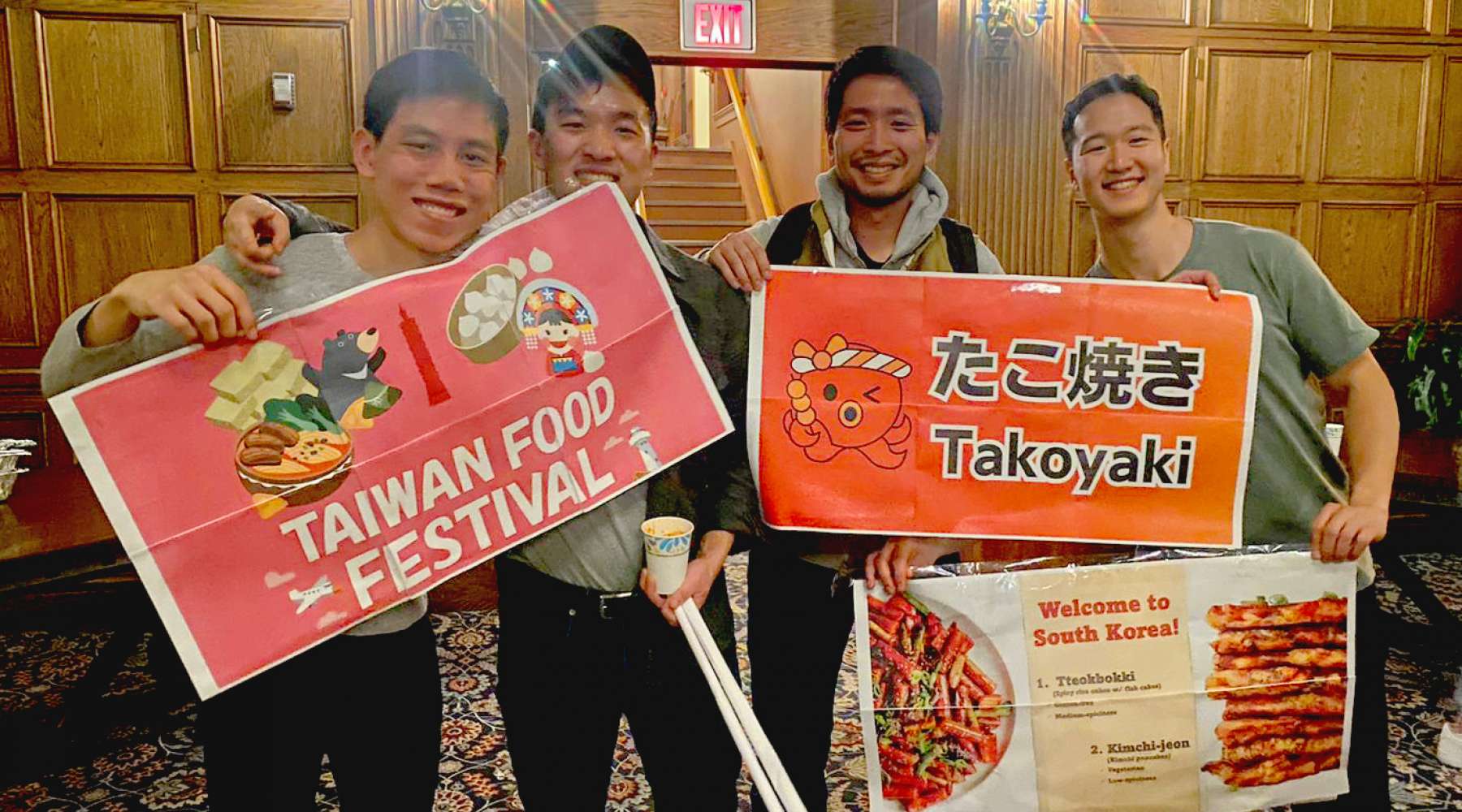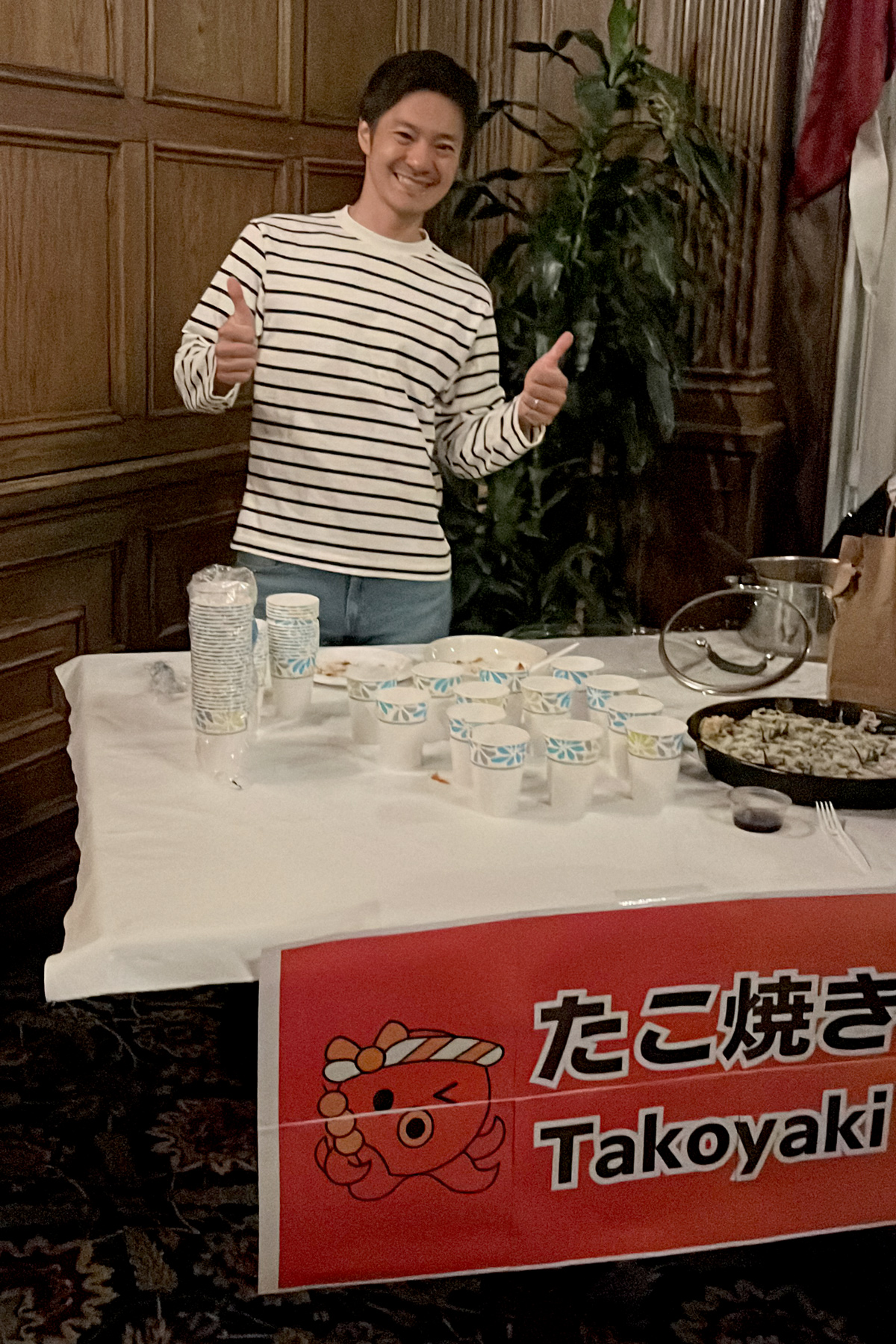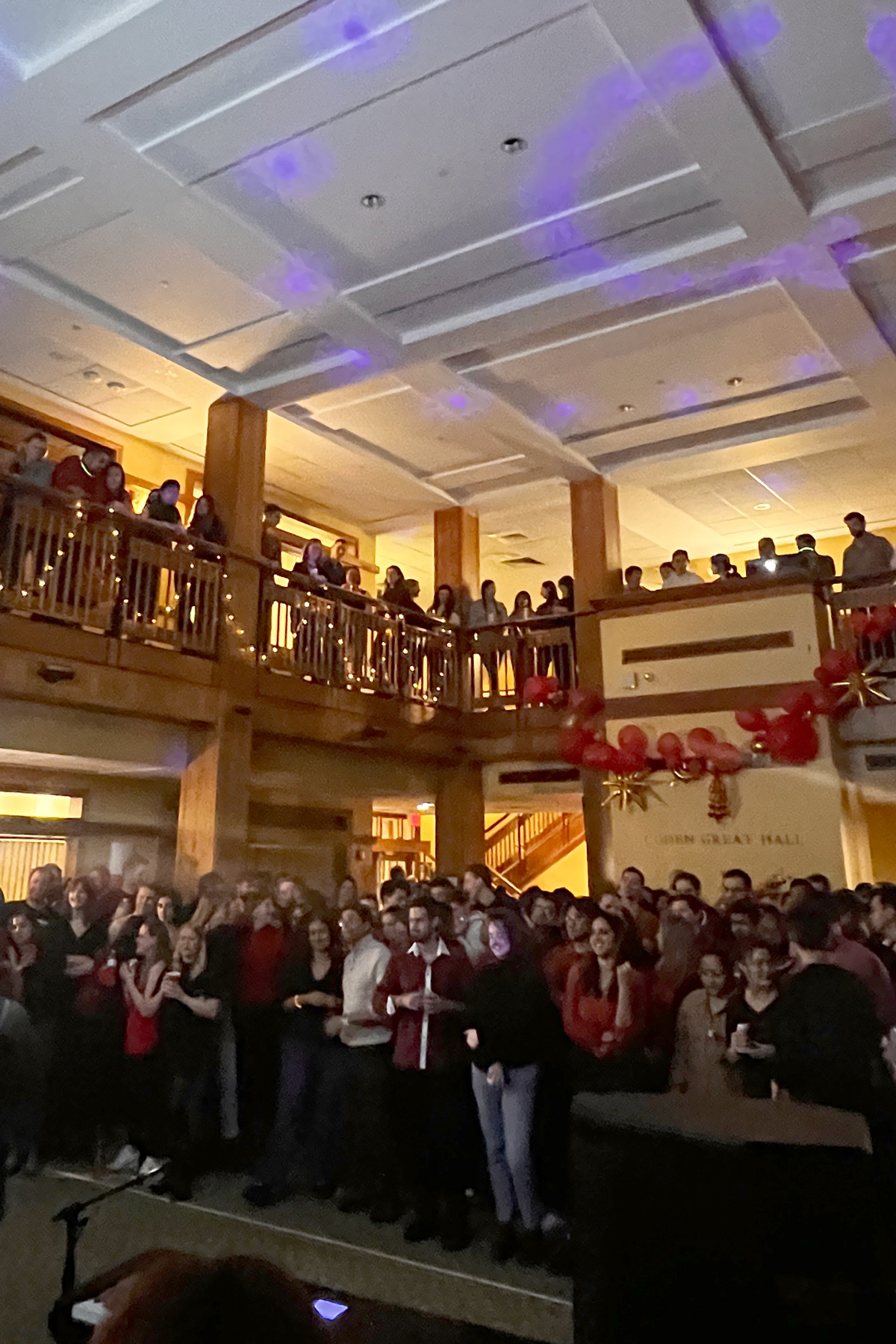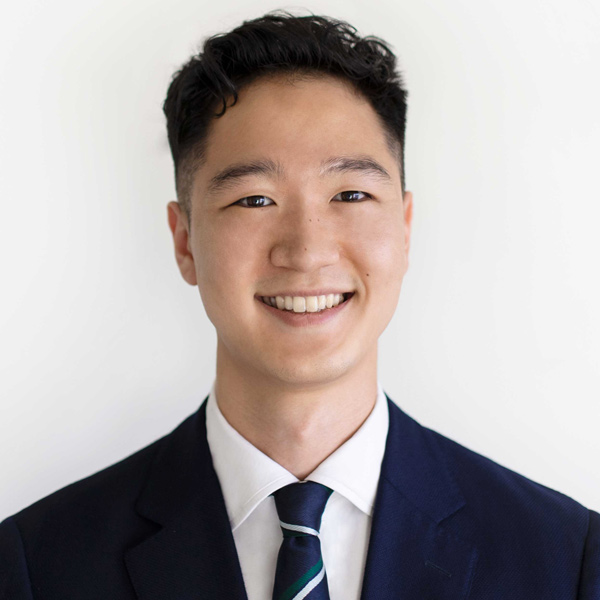
Chris Ahn T’24 (far right), co-chair of ABC, helped organize the Club’s Asian Night Market in Stell Hall.

Tuck’s Asia Business Club (ABC) serves as a bridge between those who self-identify as or are allies of Asian and Pacific Islanders and the rest of the Tuck community. We regularly host cultural, business, and career events to build community and educate the broader school about our identity and heritage.
What are some recent event highlights you can share? How did they go?
This Spring Term, we organized two events—the Asian Night Market and Karaoke Night. For the Asian Night Market, we transformed Stell Hall into a food court much like the bustling street markets found across Asia (as a reference, picture the mouth-watering Singapore food market scene in Crazy Rich Asians). The room’s high ceilings and lanterns complemented the vendor booths, which showcased eight delicious Asian cuisines including Japanese Takoyaki, Chinese meat buns, Indian veggie samosas, Taiwanese popcorn chicken, Vietnamese banh mi, Nepalese chicken momo, and more. The diverse food selection illustrated the vibrant cultural tapestry at Tuck, and the kicker was that nearly all the food was home-cooked. I am often amazed by the culinary talent at this school, and evidently so are our peers, since tickets, which raised funds for the Tuck Emerging Markets Conference, sold out immediately.
“Food is a universal language of love, and this is particularly true in Korean culture. Cooking stacks of kimchi pancakes and pots of tteokbokki in the Whittemore Kitchen allowed me to relate to how my mother expressed love through the labor-intensive process of preparing food.”
On a more personal note, I felt that the process of cooking and serving dishes was the most meaningful part of this event. Food is a universal language of love, and this is particularly true in Korean culture. Cooking stacks of kimchi pancakes and pots of tteokbokki in the Whittemore Kitchen allowed me to relate to how my mother expressed love through the labor-intensive process of preparing food. Seeing the smiles on my friends’ faces as they ate my dishes took me back to those fond memories and helped me feel more connected to my classmates and to my own roots. I’m sure the other volunteers, who worked incredibly hard to make this night a success, felt similarly.

The second event we hosted this term was Karaoke Night. Tuckies are no strangers to karaoke, as the student body has hosted multiple ones including Tuck Pride’s “Queeraoke.” We put our own spin on this beloved pastime by highlighting its roots as a Japanese innovation, offering a bounty of Asian snacks and beverages, streamlining the song-selection process, and setting up a high-quality A/V system to let singers’ voices shine through Cohen Hall. Attendance was solid, and my fellow co-chairs and I were proud to have created a space where people felt comfortable singing any genre in any language, from Chinese ballads to Brazilian dance beats. We are excited to try this again next year and to share best practices on setting up karaoke night with other clubs.
What should prospective students and incoming students know about this organization and this community?
It’s interesting to note how ABC has evolved over the years. In the past, its focus used to be career-oriented, as it served as the club for students who were interested in doing business in Asia. Over time, student leaders have unlocked its current function as a cultural affinity group that amplifies the voices of the AAPI community at Tuck. Today, I think we strike a balance of supporting students in their career endeavors from a cultural standpoint while also organizing events that cultivate a sense of belonging at Tuck. I will also add that the DEI team at Tuck—Assistant Dean Dia Draper and Kayanat Paracha—have been wonderfully supportive by connecting us to Dartmouth-wide resources and investing in our cause. A notable example was bringing in speaker/podcaster Jerry Won in the fall to speak to students and educate faculty about AAPI issues in the business world and more broadly. That level of institutional support is tremendous and we are so appreciative of them in particular.
“Whether through band parties, cultural affinity spaces, or on the recruitment grind, I have found that people at Tuck are always building each other up, and that’s what I love about being here.”
What’s your favorite thing about Tuck?
Not to take the focus away from ABC, but music has always been a part of my life, and now I’m living my best life playing guitar for the T’24 Band, “Supply and DaBand.” When applying to MBA programs, I hadn’t dreamed of performing on stage in front of hundreds of my peers, but that’s what I get to do at least four times a year, thanks in part to T’23 guitarist Calvin Garay, who encouraged me to join the band the night we met at my Admitted Students Weekend. Since then, I’ve been proud of how our band members have stayed organized, engaged creatively, and held ourselves accountable to put on the “electric” shows we aim for. It all came full circle for me at this year’s Admitted Students Weekend concert as our classmates hyped us up to the T’25s. Their enthusiasm made me realize that we weren’t just a band—we were their band, and it was humbling that we had earned their trust to close out the weekend. Whether through band parties, cultural affinity spaces, or on the recruitment grind, I have found that people at Tuck are always building each other up, and that’s what I love about being here.
Get to know other cultural affinity clubs at Tuck.

Chris is from Fairfax, VA and graduated from Washington and Lee University (Lexington, VA) with a B.S. in Business Administration. Prior to Tuck, he worked in education, first as a Teach for America Corps Member in Tulsa, OK, and then doing FP&A at Uncommon Schools in New York City. At Tuck, Chris is co-chair of the Association for Christian Tuck Students (ACTS), Asia Business Club (ABC), and the Tuck Band, and is a Non-profit Board Fellow.